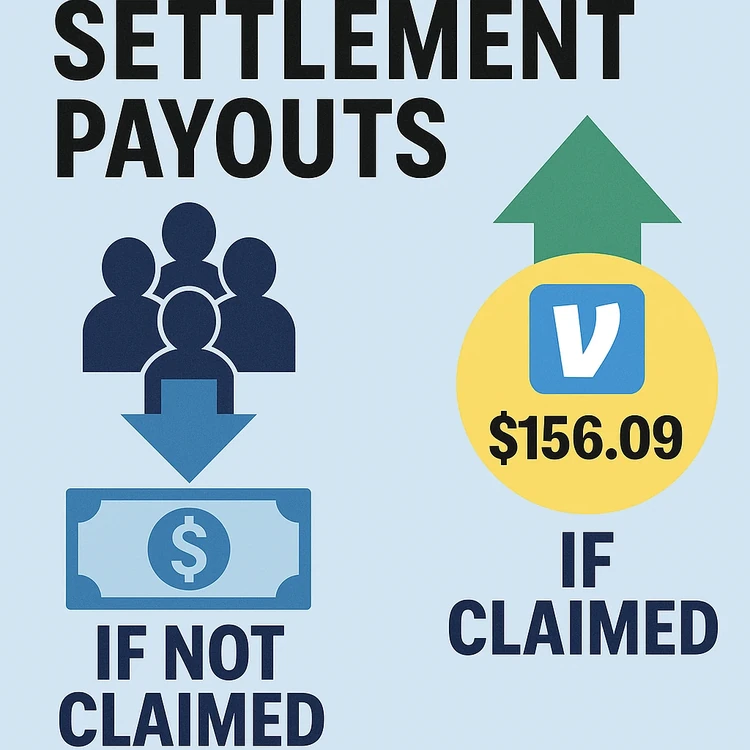The payments follow a $27.5 million settlement approved in October
April 24, 2025
Key Takeaways
- $156.09 payments sent to Californians as part of $27.5M settlement over CLEAR data sales
- Lawsuit alleged Thomson Reuters sold Californians personal data without consent
- Low claim rate led to larger payouts for those who filed fewer than 150,000 out of millions
Californians who filed a claim in a landmark privacy class-action lawsuit against media conglomerate Thomson Reuters received an unexpected Venmo boost this week: $156.09 per person, sent from the CLEAR Privacy Settlement Administrator.
The payments follow a $27.5 million settlement approved in October, resolving allegations that the company sold personal data through its CLEAR platform without user consent.

The lawsuit initiated in 2020 by Bay Area activists Rasheed Shabazz and Cat Brooks, a journalist and former Oakland mayoral candidate accused Thomson Reuters of compiling and selling sensitive data to police, government agencies, and corporations without informing the people affected, SFGATE reported.
What is CLEAR and why the lawsuit happened
CLEAR is a data aggregation tool (unrelated to the airport security program of the same name) that collects and sells personal information such as addresses, DMV records, family member details, and more. Plaintiffs argued that this commercial sale of private data occurred without individuals knowledge or consent, violating Californias consumer protection and privacy laws.
In August 2023, Thomson Reuters agreed to a $27.5 million settlement, though it did not admit wrongdoing. As part of the agreement, the company pledged to revise certain CLEAR business practices.
A San Francisco judge approved the settlement in October, and a claim website was launched for Californians to apply. Eligible residents needed only to confirm their residency and submit a claim a process that reportedly took less than a minute.
Low Participation, Higher Payouts
Despite extensive outreach efforts, including online ads, social media campaigns, and news articles, only 125,000 to 150,000 valid claims were ultimately received, far fewer than expected. With millions of eligible Californians declining or unaware of the opportunity, the per-person payout rose dramatically from a projected $19$48 to $156.09.
That figure was finalized after over 21 million fraudulent claims were identified and blocked, many of them submitted by bots.
The size of the payouts shows how few people actually filed, one court administrator noted. Millions of Californians left money on the table.
A win for privacy advocates and the few who filed
While the case highlights ongoing concerns about data privacy and corporate transparency, it also underscores how many Americans miss out on class-action settlements, often due to lack of awareness or skepticism.
Still, for those who did file and checked their phones on Tuesday the result was a tangible win: $156.09, direct to their Venmo, for their data being sold without consent.
Sign up below for The Daily Consumer, our newsletter on the latest consumer news, including recalls, scams, lawsuits and more.
.newsletter-form {
display: flex;
max-width: 400px;
margin: 20px auto;
background: #f8f9fa;
padding: 10px;
border-radius: 8px;
box-shadow: 0 4px 6px rgba(0, 0, 0, 0.1);
}
.newsletter-input {
flex: 1;
padding: 10px;
border: 1px solid #ccc;
border-radius: 5px 0 0 5px;
font-size: 16px;
outline: none;
}
.newsletter-input:focus {
border-color: #007bff;
}
.newsletter-button {
background: #2976D1;
color: white;
border: none;
padding: 10px 15px;
font-size: 16px;
border-radius: 0 5px 5px 0;
cursor: pointer;
transition: background 0.3s ease;
}
.newsletter-button:hover {
background: #0056b3;
}
#Californians #receive #Venmo #payouts #Thomson #Reuters #privacy #settlement